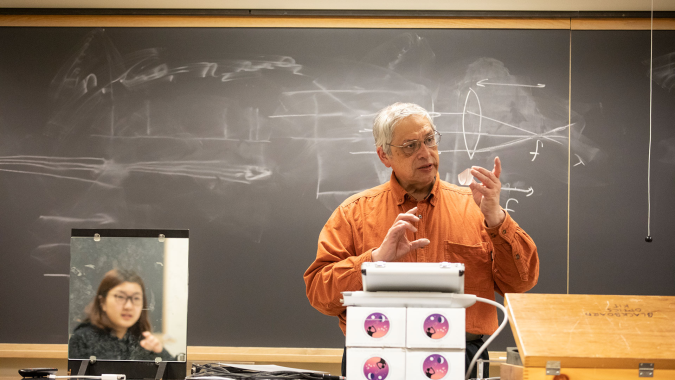
By Noah Smith '20
Have you ever stared up at the night sky and fathomed how all those stars got there? How could something so vast and amazing be so seemingly still and silent? In CC's summer Astronomy course, the emphasis is an appreciation of the physical universe and all its surrounding phenomenon.
Lincy Qin '20, a rising senior from the class, describes the course being a lot more than what the title offers, saying, "I thought this class was going to be mainly about stars and constellations, but it's been much more than that. We are learning about the secrets of the universe."
Visiting Professor Juan Burciaga, says, "One of my favorite things about teaching this class is that I'm able to provoke questions of wonder. My goal is to get them to start asking questions because that's what science really is. People say science is a bunch of answers, but really, it is a bunch of questions." And with topics ranging from the movement of the planets to the Big Bang, questions are abundant.
In the classroom, chalk-drawn equations fill the boards and boxes of DIY telescopes cover the back tables, to be used by the students during their lab later that night. Sitting in groups around lab tables, students discuss and deliberate following Professor Burciaga's lecture on the creation of the universe.
An introductory survey course of astronomy that fulfills the college's lab credit requirement, the course receives students with many diverse academic interests. For some students, the class is a pleasant surprise for a science course. Shirley Xu '21 says, "I'm not very interested in science, but astronomy was the most interesting option out of all them for me. I'm intrigued by black holes and the constellations, so I've been really enjoying learning about that. The field trip was also something that I was looking forward to."
In addition to their classroom on campus, the students were able to experience another classroom at the Colorado College mountain cabin where they spent an evening under the stars, learning about constellations and how to read the sky. This trip to the cabin mirrors the labs that the students have been conducting throughout the block, which include learning to use telescopes, taking photographs of the sky, and using a spectroscope.
However, having a clear night sky in Colorado is always uncertain with the weather, and Professor Burciaga is no stranger to this. "The class has been lucky enough to have some good skies, but we've also had some cloudy skies where we were unable to see anything. We were able to go out to the cabin for one night, and luckily enough, the sky cooperated with us that evening, which was a perk for the students and myself," he says. Another notable perk of the course has been Professor Burciaga himself. Rising junior Heba Shiban '21 imparts, "I've really enjoyed how funny Professor Juan is. He's a natural entertainer."
During the first week, Professor Burciaga opens his astronomy course with Walt Whitman's poem, "When I Heard the Learn'd Astronomer," where the speaker of the poem describes listening to a learned astronomer lecture. He sees proofs and figures in columns before him, as well as charts and diagrams that he is supposed to analyze mathematically. At the end of the lecture, everyone else applauds the astronomer. Meanwhile, the speaker sits in the lecture room, feeling sick and tired. When he wanders away, he looks up into the sky and finally realizes the magic. In this astronomy course, realizing the magic is just part of the experience.



